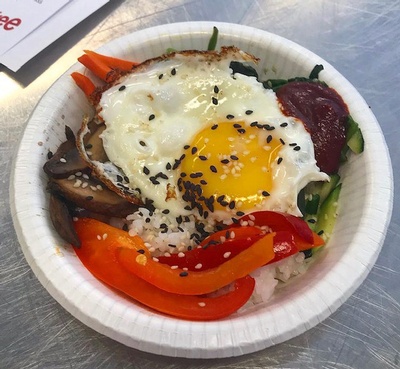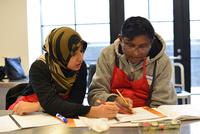by Breshay Woods, Culinary Literacy Center Intern
Edible Alphabet is a free English Language Learning (ELL) program offered by the Free Library's Culinary Literacy Center. Our mission is to teach English language and literacy skills through hands-on cooking projects. For the time being, all Edible Alphabet classes are being run virtually in the interest of public health and safety.
This week, we are sharing another one of our favorite class recipes from Edible Alphabet English: Vegetable Bibimbap. Bibimbap is a Korean dish that translates to "mixed rice". Although there are many variations, bibimbap always includes cooked rice, cooked and seasoned vegetables, and Korean fermented red chili pepper paste (gochujang). Our recipe features carrots, mushrooms, pepper, zucchini, spinach, and an egg for protein.
Interested in learning more about Korean language, culture, and cooking? Check out these electronic and print resources below, all available for free with your library card:
- Learn Korean with Mango Languages!
- Use the streaming platform Kanopy to explore many genres of Korean film!
- Browse our catalog for books about Korean language, culture, and cooking!
- Borrow a K-Pop album through Hoopla!
Finally, here is our class bibimbap recipe that the whole family can enjoy:
Vegetable Bibimbap (Serves 4)
Ingredients
- 2 cups short-grain rice
- 2 cups spinach
- 1 large carrot
- 1 red bell pepper
- 1 zucchini
- 1 green onion/scallion
- 6 oz. fresh mushrooms
- 4 eggs
- 1 clove garlic
- 1 ½ tsp. toasted sesame oil, divided (plus more for serving)
- 1 tsp. sesame seeds (plus more for serving)
- 1 tsp. soy sauce
- Salt
- Vegetable oil
- Gochujang chili paste
Instructions
Rice
- Rinse rice in cold water until the water runs clear, then drain.
- Combine rice in a pot with 2 cups of water. Cover and soak for 30 minutes.
- Heat rice over medium-high heat until boiling. Stir rice, cover the pot, and reduce heat to low.
- Simmer rice for 10–15 minutes until fully cooked and fluffy. Remove from heat. Fluff rice with a spoon.
Spinach
- Stir-fry spinach in a skillet with 1 tsp. of water for 3–4 minutes. Remove from the skillet.
- Mince ½ clove garlic. Mix spinach, garlic, 1 tsp. sesame oil, ½ tsp. salt, and 1 tsp. sesame seeds.
Mushrooms
- Slice mushrooms.
- Stir-fry the mushrooms with 1 Tbsp. soy sauce until lightly browned, about 6–8 minutes.
Carrots
- Cut carrot into matchsticks. Place in a bowl and mix with ½ tsp. salt. Rest for 5 minutes.
- Heat skillet over medium-high heat with a few drops of vegetable oil. Sauté carrots for 1 minute.
Peppers
- Seed red pepper. Cut into thin strips.
- Heat skillet over medium-high heat with a few drops of vegetable oil. Add red peppers and a pinch of salt. Sauté red peppers for 30 seconds.
Zucchini
- Cut zucchini into matchsticks. Place in a bowl and mix with ½ tsp. salt. Rest for 5 minutes.
- Heat skillet over medium-high heat with a few drops of vegetable oil. Sauté zucchini with ½ clove minced garlic, chopped green onion, and ½ tsp. sesame oil for 1 minute.
Bibimbap
- Heat 2 Tbsp. of vegetable oil in a skillet over low heat until shimmering. Add eggs to skillet, cover with a lid, and cook until whites are set (2–3 minutes). Remove eggs from the skillet and season with salt and pepper.
- Divide rice into 3 bowls. Arrange spinach, carrots, peppers, zucchini, mushrooms, and egg on rice. Top each bowl with a drizzle of sesame oil, a sprinkle of sesame seeds, and gochujang paste.
Edible Alphabet is made possible through the generous support of the Dry Family Foundation and Dietz & Watson.
For more information about Edible Alphabet and the Culinary Literacy Center, visit freelibrary.org/cook or email kitchen @ freelibrary.org.
Enjoy this recipe? Leave a comment and stay tuned for more Edible Alphabet recipes in the coming weeks.
Have a question for Free Library staff? Please submit it to our Ask a Librarian page and receive a response within two business days.



